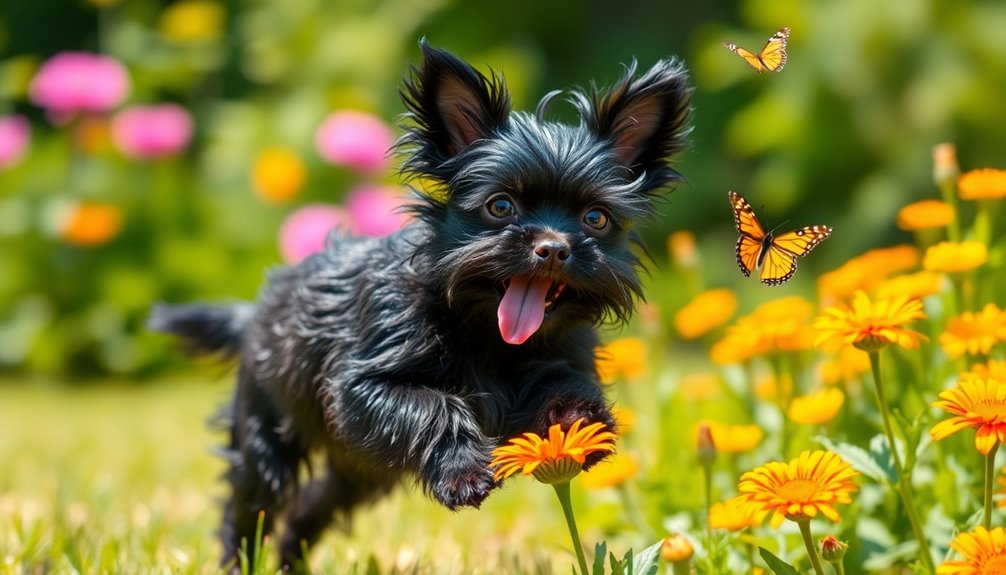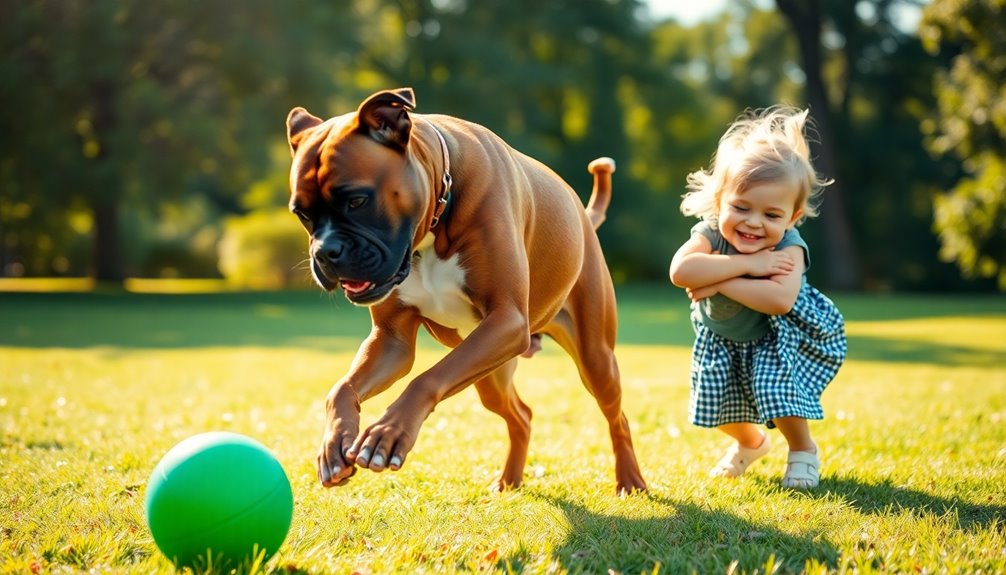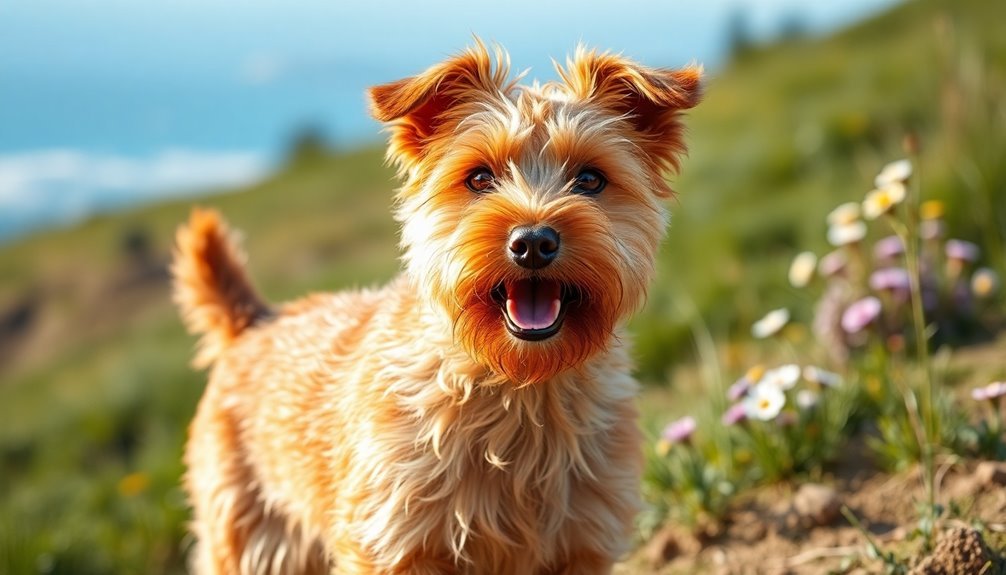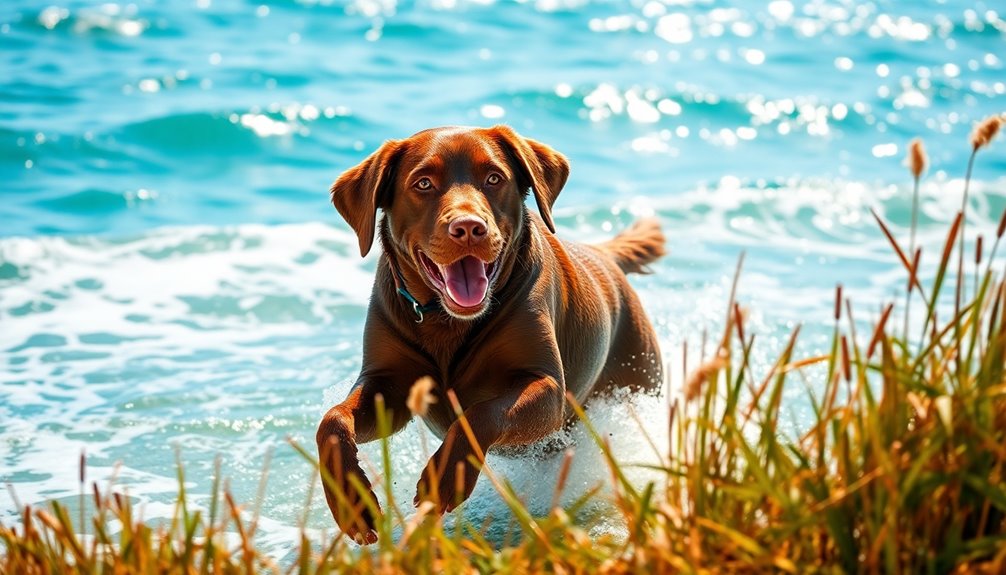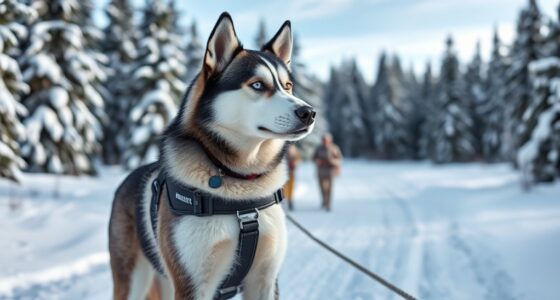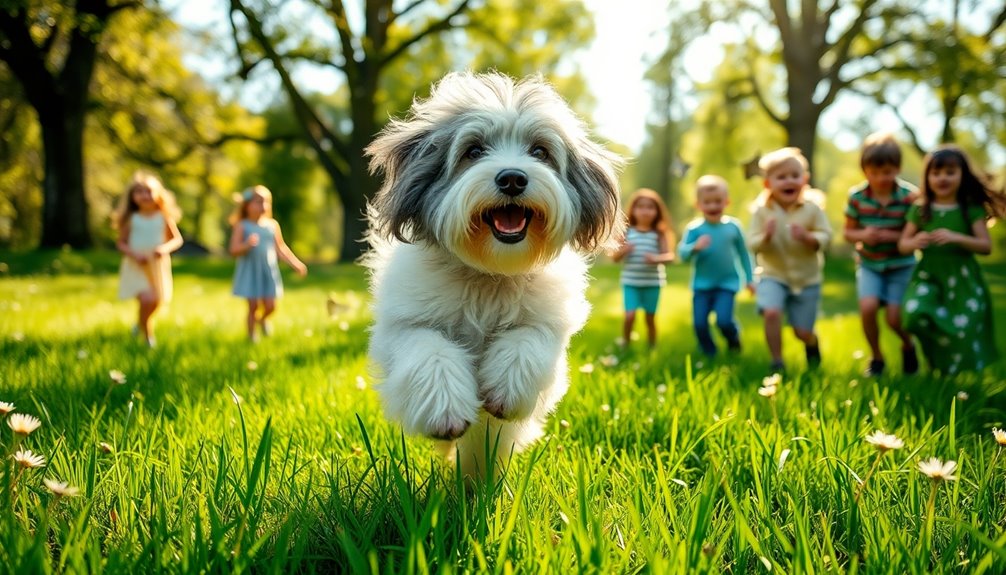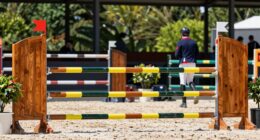If you're looking for a playful and fearless companion, the Affenpinscher might be perfect for you. This small dog, standing between 9 and 11.5 inches tall and weighing 5 to 14 pounds, charms with its unique "monkey-like" face. Known for their affectionate and curious nature, they bond closely with families. Training may require patience due to their strong-willed attitude, but their intelligence shines through. They need daily engagement and adapt well to various living situations, including apartments. Interested in exploring their grooming needs and health tips? There's plenty more to uncover about this delightful breed.
Key Takeaways
- Affenpinschers are small, sturdy dogs with a playful, curious nature and a distinctive "monkey-like" face characterized by a short muzzle and large dark eyes.
- Originating in Germany, they were initially bred in the 1600s as rat-catching companions and were recognized by the AKC in 1936.
- Regular grooming is essential for their wiry coat, requiring brushing 2-3 times weekly and regular trimming to prevent matting.
- They need 20-45 minutes of daily exercise, thriving on playtime and interaction, making them suitable for apartment living.
- Consistent training and early socialization are crucial to manage their strong-willed nature and prevent fearfulness, using positive reinforcement techniques.
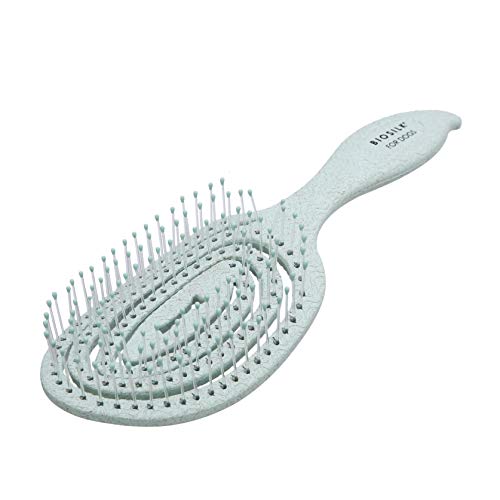
BioSilk for Pets Eco Friendly Detangling Pin Brush for Dogs, Gentle Dog Grooming Brush Designed to Help Remove Knots and Tangles and Support Healthy Coats for All Dogs
DETANGLING PIN BRUSH FOR DOGS: Designed to help gently remove knots and tangles during everyday dog grooming routines,…
As an affiliate, we earn on qualifying purchases.
As an affiliate, we earn on qualifying purchases.
Introduction
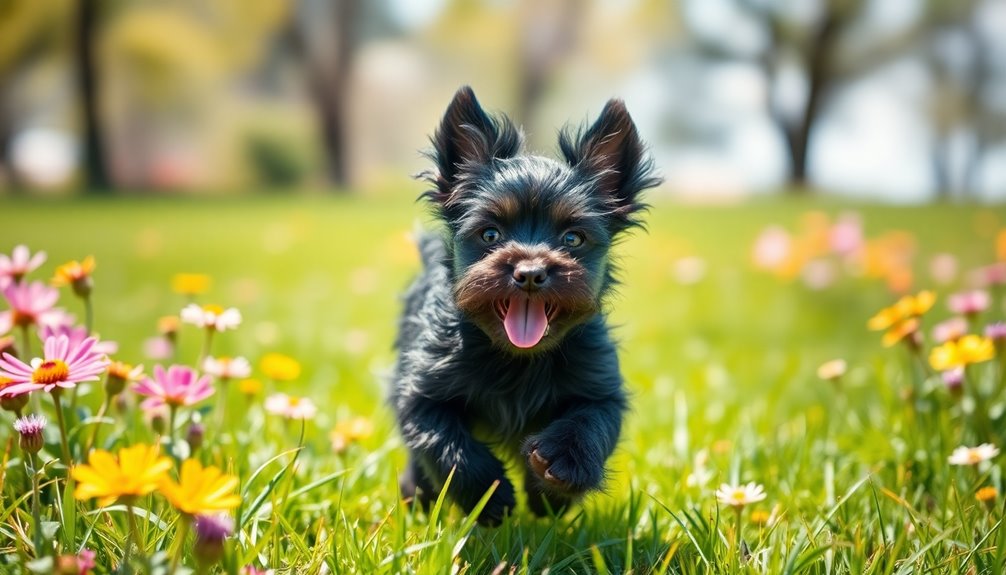
Affenpinschers are unique little dogs with a personality that packs a punch. Standing just 9 to 11 inches tall and weighing between 5 and 14 pounds, these sturdy, compact canines boast a square appearance. Their wiry coats can come in various colors, including black, tan, and red, and they're easily recognizable by their "monkey-like" faces, featuring large dark eyes and a short muzzle.
What sets Affenpinschers apart is their fearless demeanor. Despite their small size, they're courageous and make excellent watchdogs, fiercely protective of their families. Their alert and inquisitive nature makes them lively companions, but be prepared for their independent streak. Early socialization and consistent leadership are essential for a well-rounded temperament. Affenpinschers are known for their strong character, which requires early socialization and training to thrive.
Affenpinschers are highly intelligent and respond well to training, excelling in various dog activities. They need regular exercise—about 20 to 40 minutes a day—to stay healthy and happy.
With high social needs, they thrive on interaction with their families. Keep in mind, they're not always compatible with small pets due to their heritage as rodent hunters. Embrace their playful spirit, and you'll find a loyal companion in the Affenpinscher.

TRIXIE Dog Agility Hurdle Cone Set – Dog Agility Set with Height Adjustable Crossbar for Beginners & Advanced, Dog Agility Equipment for Dog Obstacle Courses – 6 x Cones, 3 x Agility Rods
DOG AGILITY: The TRIXIE dog agility jump is the ideal starter kit to introduce your dog to interactive…
As an affiliate, we earn on qualifying purchases.
As an affiliate, we earn on qualifying purchases.
History and Origin
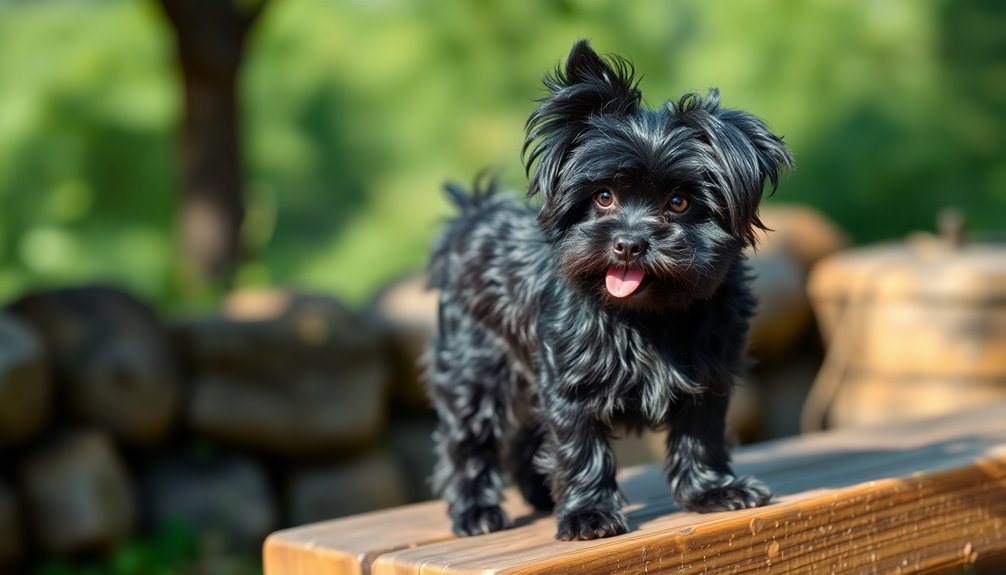
The Affenpinscher originated in Germany during the 1600s, where it served as a rat-catching companion dog in homes and stables. This breed was specifically developed to control pests while also providing companionship. Over time, its smaller size became the standard, distinguishing it from its now-extinct larger relatives. The breed was recorded in the Deutschen Hundestammbuch in 1880, solidifying its recognition and status.
Where and when the breed originated
Originating in Germany during the 1600s, the Affenpinscher has a rich history tied to the development of various European breeds. Specifically, you'll find its roots in Munich and other regions of Germany, where it began to take shape as a distinct breed. Early on, these little dogs played important roles in households, often found in stables and kitchens. As time passed, they became influential in the development of other breeds, including the Brussels Griffon and the Miniature Schnauzer. The breed's standards started to form in the early 20th century, with the German Kennel Club recognizing the Affenpinscher in 1896. In 1902, the Berlin Lapdog Club laid down initial breed standards, which were later finalized in 1913. Through selective breeding, the Affenpinscher's size decreased, transforming into the charming companion dog we know today.
The Affenpinscher exhibits a big personality that enhances its appeal as a companion dog. While European kennel clubs recognized the breed long before it made its mark in America, the American Kennel Club officially recognized the Affenpinscher in 1936, adding "Miniature" to its name in 1972. The Affenpinscher's journey from Germany to global recognition showcases its unique charm and appeal.
Rat-Catching Companion Dog
Initially bred for their rat-catching abilities, Affenpinschers quickly became valued companions in German households. These small, wiry dogs were essential in controlling rodent populations in stables, kitchens, and granaries, especially during the plague in the 17th and 18th centuries. Their fearlessness and tenacity made them capable of tackling even larger vermin, and they could chase off critters far bigger than themselves. In the 1600s, a German man from Liibeck bred ratting terriers specifically for kitchens, marking the early beginnings of the Affenpinscher's development as a working dog.
As their role evolved, Affenpinschers transitioned from working in barns to becoming beloved family pets. Their distinctive, monkey-like faces and shaggy fur only added to their charm. With a courageous and intelligent temperament, they possess a strong prey drive, remnants of their rat-catching days. This makes them alert watchdogs, always ready to defend their families.
Over time, Affenpinschers contributed to the development of other breeds, like the Brussels Griffon and Miniature Schnauzer. They also found themselves entertaining audiences in circuses due to their playful nature.
Today, they excel in show rings, therapy work, and various canine sports, proving that their spirited personalities still shine brightly, whether catching rats or cuddling with you on the couch.

oneisall Dog Clippers for Grooming for Thick Heavy Coats/Low Noise Rechargeable Cordless Pet Shaver with Stainless Steel Blade/Waterproof Dog Shaver for Dogs Pets and Animals (Silver)
𝐃𝐨𝐠 𝐂𝐥𝐢𝐩𝐩𝐞𝐫𝐬 𝐟𝐨𝐫 𝐆𝐫𝐨𝐨𝐦𝐢𝐧𝐠 𝐟𝐨𝐫 𝐓𝐡𝐢𝐜𝐤 𝐂𝐨𝐚𝐭𝐬:Dog clippers with stainless steel metal blades is specially designed for grooming…
As an affiliate, we earn on qualifying purchases.
As an affiliate, we earn on qualifying purchases.
Physical Characteristics
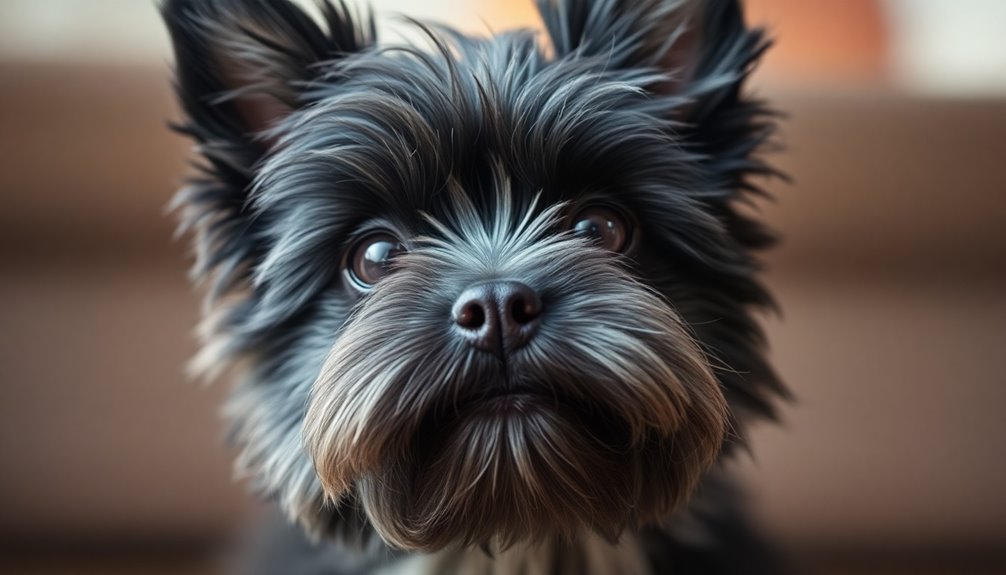
When you look at an Affenpinscher, you'll notice they stand between 9-11 inches tall and weigh around 7-10 pounds.
Their wiry coat can be rough or soft, depending on grooming, and they often sport a distinctive beard-like appearance. This combination of size and unique facial features gives them a charming and memorable look. By the time they reach full size at around 12-18 months, their playful and fearless nature truly begins to shine.
Size, weight, and coat details
The Affenpinscher is a compact and sturdy breed, standing between 9 to 11.5 inches tall and typically weighing around 6 to 13 pounds. Males and females generally average around 10 inches in height and usually fall within the same weight range of 7 to 9 pounds. Their overall body length spans from 12 to 15 inches, and they've a broad chest that contributes to their robust appearance.
When it comes to coat details, the Affenpinscher boasts short- to medium-length, wiry fur that's dense, coarse, and shaggy. You'll find them in various colors, including black, gray, silver, black-and-tan, red, and ruddy brown. The longer fur on their head and shoulders gives them a distinctive mane-like look. Additionally, this breed has a hypoallergenic coat, making them a suitable choice for allergy sufferers.
One great aspect of their coat is the low amount of shedding, making them a bit easier to maintain.
With their monkey-like face, large dark eyes, and unique build, Affenpinschers are undeniably charming. Their ears can be floppy, upright, or semi-erect, and their tails may be docked or natural, often showing a slight dorsal curve.
Beard-Like Facial Hair
Affenpinschers are easily recognizable thanks to their distinctive beard-like facial hair, which adds to their charming, monkey-like appearance. This breed features bushy facial hair, including a prominent mustache, beard, and eyebrows, all longer than the hair on the rest of their body. This unique facial hair enhances their quirky look and contributes to their expressive demeanor.
To maintain this signature style, regular grooming is essential. You should brush the cheeks, whiskers, and beard in layers toward the mouth using a slicker brush. Following this, comb through the brushed sections with a greyhound comb to prevent mats. If you encounter mats, gently break them apart with your fingers before combing.
Trimming is also necessary to keep the coat neat. You can trim any unruly hairs and pluck dead ones without causing discomfort. Use a medium stripping knife to help remove excess hair.
For a polished look, trim the hair around the eyes in a fan shape, ensuring their prominent black eyes remain visible. This careful grooming and trimming will blend the facial hair seamlessly into the rest of their features, creating the full Affenpinscher charm. Additionally, their wiry coat, which is shorter on the body and longer on the legs and face, contributes to their distinctive appearance.

Buddy Biscuits Trainers 10 Oz. Pouch of Training Bites Soft & Chewy Dog Treats Made with Bacon Flavor
Highly Palatable with natural pork liver base
As an affiliate, we earn on qualifying purchases.
As an affiliate, we earn on qualifying purchases.
Temperament and Personality
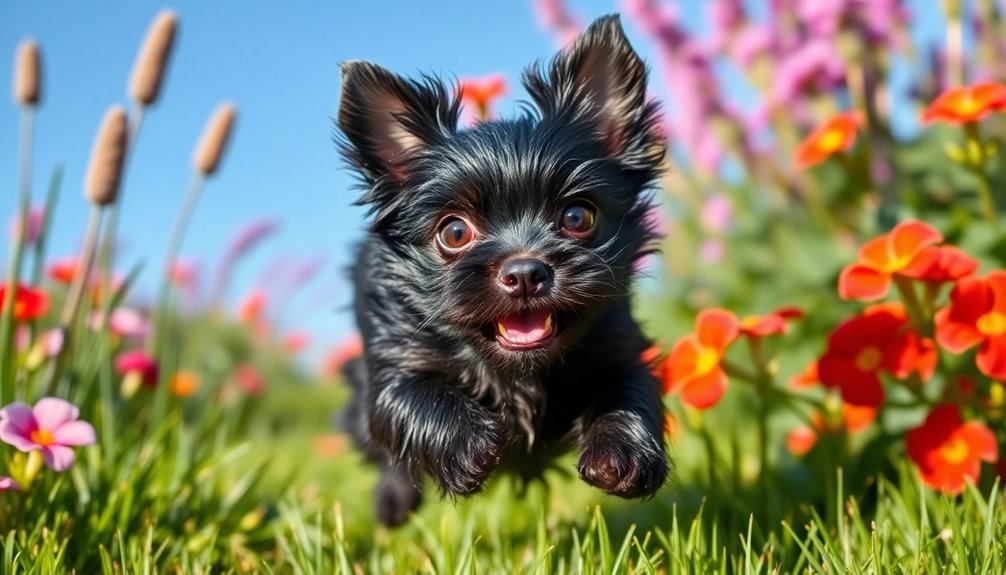
Affenpinschers have a playful and curious nature that makes them delightful companions. Their affectionate personality allows them to bond well with families, individuals, and even other pets when properly socialized. However, it's important to consider their strong-willed traits, as they require consistent training to thrive in various living situations. Their high intelligence enables them to quickly learn commands and tricks, making training an enjoyable experience for both the dog and the owner.
Playful and Curious Nature
With their energetic spirit and lively demeanor, Affenpinschers bring a playful and curious nature that's hard to resist. You'll find these little companions full of joy, ready to toss toys in the air or walk on their back legs, resembling tiny organ grinder monkeys. Their playful antics aren't just entertaining; they thrive on interaction, making them perfect for active individuals who enjoy engaging with their pets.
Curiosity runs deep in their personality. Affenpinschers are always eager to explore new sights and sounds, embodying a lively and adventurous temperament. This breed isn't just about play; they're intelligent and often display impressive problem-solving skills. To keep them happy and healthy, you'll need to provide mental stimulation through obedience training or agility exercises. Their low-shedding coat also requires regular grooming, which can be a bonding experience for you and your pet.
Despite their small stature, their fearless nature shines through. They're unafraid of larger dogs and often take on a bold attitude, making them great watchdogs. Their alertness ensures they react promptly to any perceived threat, barking in warning when necessary.
This blend of playfulness and curiosity makes Affenpinschers delightful companions that keep life exciting and vibrant.
Suitability for families, individuals, or other pets
These spirited little dogs can bring joy to various living situations, whether you're a family, an individual, or a multi-pet household. Affenpinschers are loyal and affectionate, forming strong bonds with family members. They can be patient and loving towards children, but supervision is essential due to their small size and potential territorial behavior.
If you have very small kids, be cautious—these dogs dislike being hugged or chased.
For individuals, Affenpinschers adapt well to apartments or larger homes. They thrive on daily interaction and require at least an hour of one-on-one time. If you enjoy indoor activities and moderate exercise, you'll find these intelligent dogs to be engaging companions. Additionally, their playful and affectionate nature makes them ideal companions for those who enjoy interactive play.
When it comes to other pets, Affenpinschers usually get along with other dogs, provided they're properly socialized. However, due to their strong prey drive, they mightn't be the best fit for homes with rodents.
They can coexist with cats and other animals if introduced carefully. Just ensure secure, fenced areas to prevent them from chasing small pets. With the right management, these little dogs can fit seamlessly into your home, bringing energy and affection.
Health and Lifespan
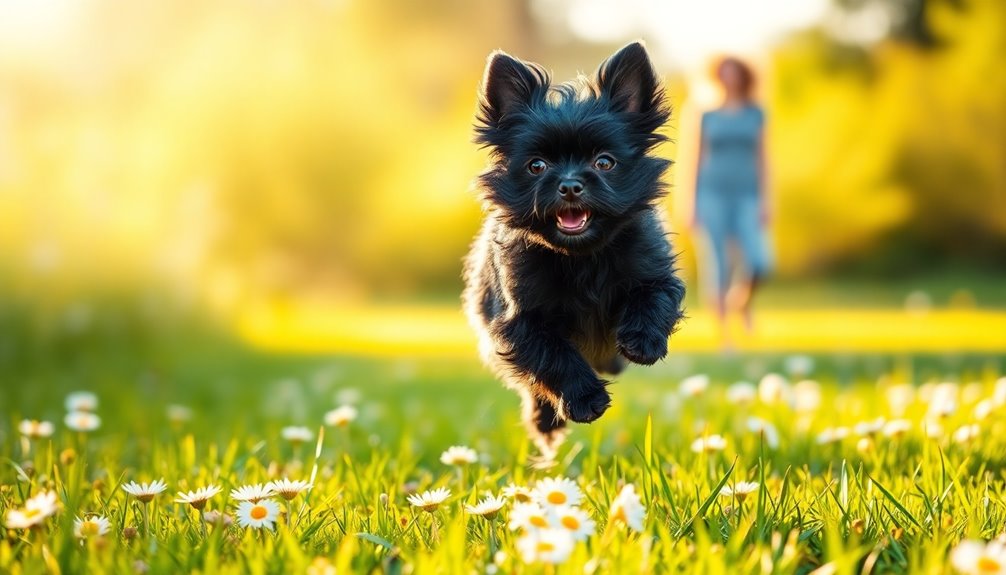
When it comes to your Affenpinscher's health and lifespan, you can expect them to live between 12 to 15 years on average. However, be aware of common health issues like hip dysplasia and respiratory problems, which can affect their quality of life. Regular veterinary check-ups are essential for early detection of common health issues that may arise as your dog ages. Additionally, being aware of risk factors can help you take proactive measures to maintain your dog's health.
Typical lifespan of the breed
The typical lifespan of an Affenpinscher ranges from 12 to 14 years, with some sources suggesting it can extend to 15 years under optimal care. Your dog's longevity largely depends on the care you provide, including proper nutrition and regular veterinary check-ups. By being attentive to their health, you can help your Affenpinscher reach the upper end of their life expectancy range.
While their lifespan is fairly standard for small breeds, it's essential to recognize that factors like genetics and environmental conditions can influence how long your furry friend lives. Keeping them away from extreme temperatures and ensuring they've a balanced lifestyle with moderate exercise will contribute positively to their longevity. Additionally, Affenpinschers typically have a life expectancy of around 12 to 14 years, which is consistent with your commitment to their well-being.
Regular health checks and preventive care are vital in catching any potential issues early. Although studies show that purebred dogs generally have a life expectancy of around 12.7 years, with the right approach, your Affenpinscher can live as long as or even longer than many other small breeds.
Being a proactive pet owner can significantly impact your dog's quality of life and longevity, so stay engaged in their health and happiness.
Common health concerns or genetic predispositions
Common health concerns and genetic predispositions can significantly impact the well-being of your Affenpinscher. This breed is prone to several orthopedic issues, such as patellar luxation, where the kneecap slips out of place, and hip dysplasia, which can lead to mobility problems. Additionally, conditions like Legg-Calve-Perthes and umbilical hernias are also reported. Affenpinschers are generally considered a healthy breed but may still experience these health challenges.
Eye problems are common as well. Progressive retinal atrophy (PRA) is an inherited condition that may lead to blindness, typically beginning around 3-5 years of age. Other eye issues include cataracts and corneal dystrophy, which can impair vision.
You should also be aware of cardiovascular and respiratory concerns. Brachycephalic airway syndrome affects many Affenpinschers, making breathing difficult due to their short snouts. Mitral valve disease is another condition that often arises in older dogs.
Lastly, while there are no debilitating genetic diseases currently known in the breed, Affenpinschers can face risks related to surgery, heat sensitivity, and complications from obesity.
Regular veterinary check-ups and screenings can help you stay ahead of these potential health issues.
Tips for maintaining health and wellness
Maintaining the health and wellness of your Affenpinscher is vital, especially considering the breed's predisposition to various health concerns. Start with regular grooming; brush their wiry coat two to three times a week to prevent matting and tangling, and give them baths to keep their skin healthy. Don't forget to trim their nails and check their ears regularly.
Next, focus on a balanced diet tailored to your dog's specific needs. Consult your vet for dietary recommendations, avoid harmful ingredients, and monitor their food intake to prevent obesity, which can lead to serious health issues. Since Affenpinschers are prone to dental disease, incorporating regular dental care is important to maintain their oral health.
Exercise is crucial for your Affenpinscher's physical and mental well-being. Engage in short walks and playtime daily, and provide indoor activities during extreme weather. This not only keeps them fit but also helps prevent boredom.
Finally, regular veterinary care is essential. Schedule check-ups and vaccinations to catch potential health issues early. Consider pet health insurance to help with medical costs. By staying proactive about your Affenpinscher's health, you can significantly improve their lifespan and overall quality of life.
Care Requirements
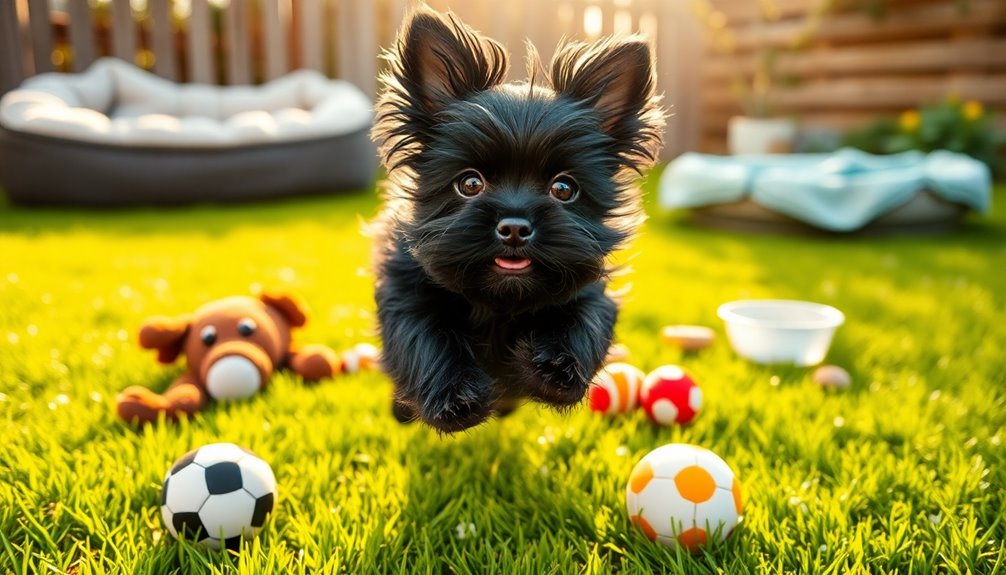
Caring for your Affenpinscher involves regular brushing to keep their coat clean and free of tangles. You'll need to incorporate daily exercise to match their energy levels, ensuring they're both physically and mentally stimulated. Additionally, providing a balanced diet is essential for their health and well-being, so let's explore the best feeding tips and dietary recommendations. It's important to note that small size leads to minimal dietary requirements, so choosing quality food is crucial for their overall health.
Regular Brushing Required
Regular brushing is essential for keeping your Affenpinscher's coat in top condition. You'll want to brush your pup a few times a week to maintain that dense, wiry, medium-length coat. Using a bristle brush or a slicker brush is highly recommended; these tools effectively remove loose fur and help prevent matting. A metal comb can also come in handy for detangling any knots that may form.
Although Affenpinschers don't shed excessively, regular grooming minimizes loose hair around your home. Fortunately, their coat doesn't grow continuously, so you won't need frequent trims. However, it's a good idea to tidy up around their eyes, ears, and paws from time to time. Regular grooming not only helps maintain the coat's appearance but also promotes bonding between dog and owner.
Consider using hand-stripping techniques to remove dead hairs while preserving the coat's natural rough texture. While clipping can alter the appearance, it's an option if you prefer that route.
Don't forget that maintaining your Affenpinscher's overall health also involves regular baths, dental care, and nail trimming. By staying consistent with these grooming practices, you'll ensure your furry friend looks great and feels comfortable.
Exercise requirements and energy levels
How do you keep your Affenpinscher happy and healthy? The key lies in meeting their exercise requirements and managing their energy levels. Aim for 20-45 minutes of daily activity that includes walks, playtime, and mental stimulation. This moderate intensity keeps them fit, and it's essential for their overall well-being.
Despite having low to moderate energy levels, your Affenpinscher needs regular physical activity to prevent boredom. A balance between active play and relaxation is crucial. They can adapt well to various lifestyles, making them suitable for families or individuals, even in apartment living. Additionally, their medium activity level means they require about 30 minutes of activity daily to stay healthy and happy. Engaging in consistent socialization opportunities helps prevent fearfulness and promotes confidence in various environments.
Just be sure to provide ample opportunities for mental challenges, as these little dogs thrive on stimulation.
Keep an eye on your pup during exercise, especially in warm weather, as their small noses can increase the risk of overheating. Ensure they've access to water, and monitor their body temperature.
Regular social interactions are vital too, as they may confront larger dogs. With consistent training and socialization, you'll help your Affenpinscher grow into a well-adjusted companion, ready for both fun and relaxation.
Feeding tips and diet recommendations
Maintaining your Affenpinscher's happiness and health also involves paying attention to their diet. Start by providing high-quality protein from animal sources like beef, chicken, and eggs. Balanced fats are essential for energy, while small amounts of carbohydrates from vegetables and berries offer fiber and antioxidants. Don't forget vital vitamins and minerals that support various bodily functions. Additionally, be aware that 80% of dogs develop arthritis or joint pain by age 7, so proper nutrition plays a significant role in joint health.
Feed your Affenpinscher two or three meals a day, adjusting portion sizes based on their age, size, and activity level. Avoid grazing to prevent obesity, and always choose food formulated for their specific life stage. Consult your vet for personalized feeding advice.
Opt for premium pet food with real meat as the primary ingredient, steering clear of harmful fillers. Consider nutritious treats like Tibetan Dog Chews, which are high in protein but should only complement a balanced diet. You can also incorporate fresh, whole foods for variety and hydration.
Lastly, ensure your dog has access to fresh water and high-moisture foods. By following these tips, you'll help your Affenpinscher thrive while keeping them playful and energetic.
Training and Socialization
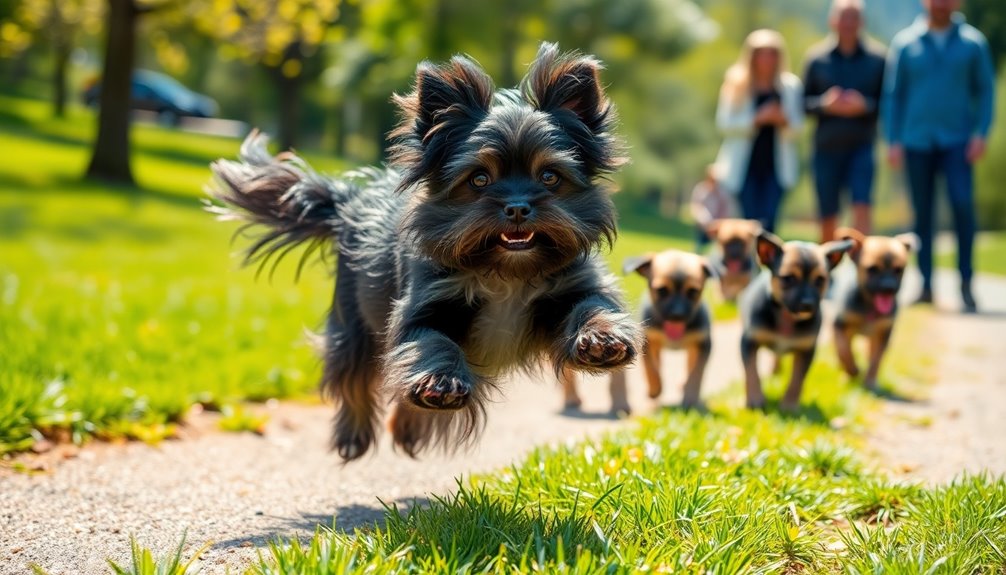
Training your Affenpinscher can be a rewarding experience, but you'll need patience due to their moderately stubborn nature. Gradual introductions to new environments are key to helping them adjust without feeling overwhelmed. Additionally, housebreaking can pose challenges, so consistency and positive reinforcement are essential in your approach. Establishing a safe environment is also vital for their emotional well-being.
Moderately Stubborn Training Temperament
Recognizing the Affenpinscher's moderately stubborn temperament is essential for effective training and socialization. You'll need a tailored approach that aligns with your dog's unique personality. A confident, experienced trainer can help set clear boundaries, addressing that stubborn streak head-on. To manage shedding, consider using lint rollers for quick clean-ups after training sessions.
Keep training sessions short and varied to maintain your dog's interest; incorporate challenges to make it feel more like a game. Patience and consistency are crucial, as Affenpinschers can be single-minded and tenacious. If training becomes monotonous, your pup may resist, so focus on positive reinforcement with treats and praise to encourage compliance. The Affenpinscher's strong prey drive can also complicate training, making early recall training even more critical.
Early socialization is equally vital, exposing your Affenpinscher to various people, dogs, and situations to foster positive behaviors. Consider enrolling in socialization classes for controlled interactions, especially since your dog may be wary of strangers. Use treats and praise to reinforce calm behavior during these encounters.
Finally, establish basic obedience skills early on, including recall training, to prevent chasing instincts from taking over. Remember, a calm and assertive approach will help you navigate the challenges of training your spirited Affenpinscher effectively.
Gradual Introductions to New Environments
Introducing your Affenpinscher to new environments gradually is key to ensuring they feel secure and confident. Start by socializing your pup in familiar places like your home or backyard, where they're most comfortable.
Keep the environment quiet, free from loud noises and other stressors, and introduce new experiences slowly. For example, let them meet a new person or hear a new sound at their own pace.
When introducing new people, begin with family members and close friends. Encourage visitors to offer treats and speak calmly, allowing your dog to approach when they feel ready.
Avoid forcing interactions, as this can create anxiety.
For interactions with other dogs, choose a neutral area to prevent territorial behavior. Begin with calm, friendly dogs, allowing them to sniff each other from a distance before getting closer.
Keep initial meetings short and positive, rewarding calm behavior with treats and praise. Additionally, since Affenpinschers are known for being playful companions, they often enjoy engaging in short games to help ease their introduction to new friends.
Finally, expose your Affenpinscher to various environments, starting with quiet places and gradually moving to busier locations.
Use a well-fitted harness and leash for safety, helping them adjust without feeling overwhelmed. This gradual approach builds their confidence and adaptability.
Housebreaking Difficulties
Facing housebreaking challenges with your Affenpinscher can be frustrating, especially given their small size and stubborn nature. Toy breeds like the Affenpinscher tend to hide accidents easily, complicating your housebreaking efforts.
Consistent crate training is essential; it helps control their small internal organs and minimizes accidents. Supervision is crucial, too—without it, you might miss accidents that set back your progress.
Start training early to tackle their strong will, using positive reinforcement techniques like treats and praise. Consistency in commands among all family members is vital to avoid confusion. Incorporating varied training programs can also help maintain their interest and motivation in training sessions.
Keep training sessions brief and enjoyable to maintain their engagement. A firm but gentle approach is necessary to prevent "small dog syndrome."
Socialization plays a significant role in your Affenpinscher's behavior. Early exposure to various people, animals, and environments will help prevent aggression and fearfulness.
Regular walks and visits to dog parks are beneficial for positive social experiences, while interaction with family pets can foster better relationships.
Ideal Living Environment
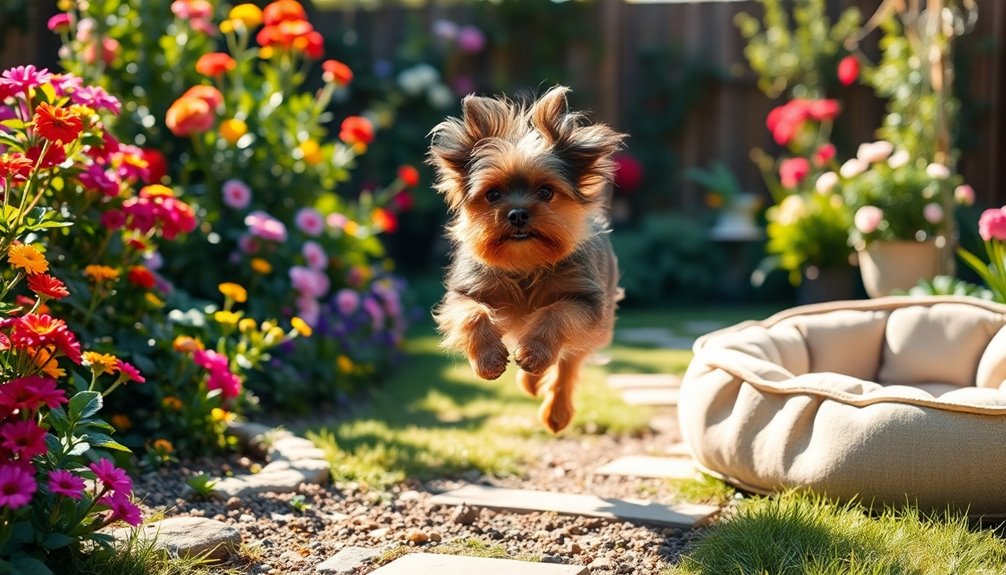
If you live in a small apartment, an Affenpinscher could be the perfect companion for you.
They thrive in moderate temperature ranges and don't need a lot of outdoor space, making them well-suited for urban living. Their strong loyalty to family members means they will be by your side, enjoying your company and participating in your daily activities.
With proper care and activity, these little dogs can adapt to your lifestyle effortlessly.
Small Apartment Living Preferred
When it comes to apartment living, the Affenpinscher shines as an ideal companion. Their compact size, standing just 9–12 inches tall and weighing between 7–10 pounds, makes them perfect for smaller spaces. You won't need a vast area for them to be happy; a cozy apartment is all they require.
With daily short walks and playtime, they get their exercise indoors, thriving without a yard. Affenpinschers adapt well to apartment life, thanks to their quiet and low-maintenance nature. They're flexible, fitting comfortably in various living environments. Their minimal grooming needs add to their appeal for busy apartment dwellers. Additionally, their sociable nature makes them great companions for families and singles alike.
Not overly energetic, they're content with about 30 minutes of exercise per day, which can include fetch or scent games.
While Affenpinschers can be vocal, they won't disturb your neighbors with excessive barking. With proper training, you can manage their barking behavior effectively.
They're independent and slightly stubborn, so patience is key. Early socialization is essential to help them adjust to new surroundings and prevent territorial tendencies.
Prefers Moderate Temperature Ranges
Affenpinschers thrive in moderate temperature ranges, making them well-suited for comfortable living environments. Ideally, these playful pups flourish in temperatures that aren't too hot or too cold. While they can tolerate some heat, it's crucial to prevent overheating. If you live in a warmer climate, ensure they've access to air conditioning or fans, especially during sleep. Regular breaks in cooler areas are essential to keep them comfortable.
On the flip side, Affenpinschers can handle a bit of cold but should never be overexposed to harsh winter conditions. If you live in colder regions, consider investing in doggy clothing for particularly chilly evenings or snowy days. Providing proper indoor shelter during extreme cold is vital for their well-being. Their average grooming needs also play a role in helping them adapt to changing weather, ensuring their coat remains in good condition.
To maintain a healthy environment, keep indoor temperatures consistent. Regular grooming helps them adapt to changing weather, ensuring their coat remains in good condition.
Uncommon Toy Group Member
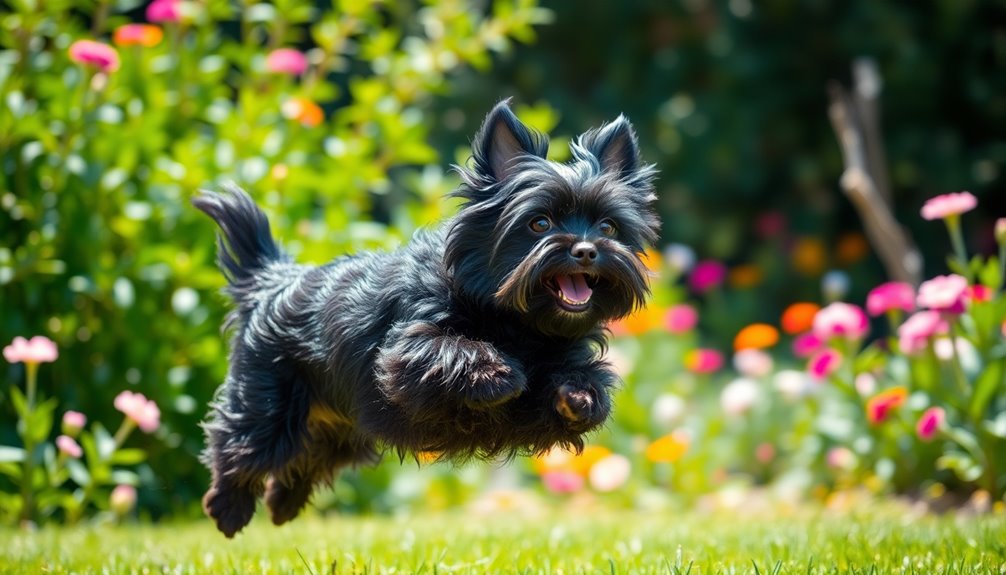
The Affenpinscher stands out in the Toy Group with its distinctive monkey-like expression, which adds to its unique charm.
You might recognize this breed from its appearance in the film 'The Artist', where it showcased its playful personality. This uncommon toy breed not only captivates with its looks but also brings a spirited presence to any household, making it a delightful household companion.
Distinctive Monkey-Like Expression
With their distinctive monkey-like expression, Affenpinschers stand out in the toy group. Their large, dark eyes and protruding lower jaw create a unique look that immediately captures attention. You'll notice the domed skull and short muzzle, which contribute to their playful appearance. Bushy, bristly eyebrows and a ring of hair around the eyes enhance this charming expression.
Affectionately nicknamed "Monkey Dog" or "Monkey Terrier," these dogs certainly live up to their moniker. Their mustache-like whiskers and imposing beard add character, while the top knot and side whiskers frame their pushed-in snout. With their confident, upright posture, Affenpinschers exude a lively spirit that's hard to resist.
Their wiry coats, available in colors such as black, gray, silver, and black and tan, complement their compact and sturdy bodies. Ears may vary from cropped to naturally dropping or standing erect. These small dogs typically weigh between 6-13 pounds, showcasing their toy breed classification.
It's this combination of features that makes your Affenpinscher not just a pet, but a true companion with a personality as vibrant as their appearance. You'll find their unique expression enchanting, making them delightful members of any family.
Featured in 'The Artist
Featured prominently in the film "The Artist," Affenpinschers prove to be an uncommon yet captivating member of the toy group. Originating in Germany in the 17th century, these little dogs were initially bred as ratters, tasked with keeping kitchens and stables free from rodents. Their history is rich, with artwork depicting them as companions dating back to the 1500s.
Affenpinschers stand 9 to 11.5 inches tall and typically weigh between 7 to 10 pounds. Their coat is short, dense, and wiry, available in colors like black, gray, and red. Known for their lively and affectionate temperament, they're also bold and fearless, making them excellent watchdogs.
However, their intelligence can lead to stubbornness, requiring consistent training and socialization from an early age to curb territorial behaviors.
With moderate exercise needs of 20-40 minutes daily, they adapt well to apartment living due to their quiet nature. Regular grooming is necessary to keep their coat in top shape.
If you're looking for a playful companion with a unique charm, the Affenpinscher could be the perfect choice for you!
Apartment-Friendly Companion?
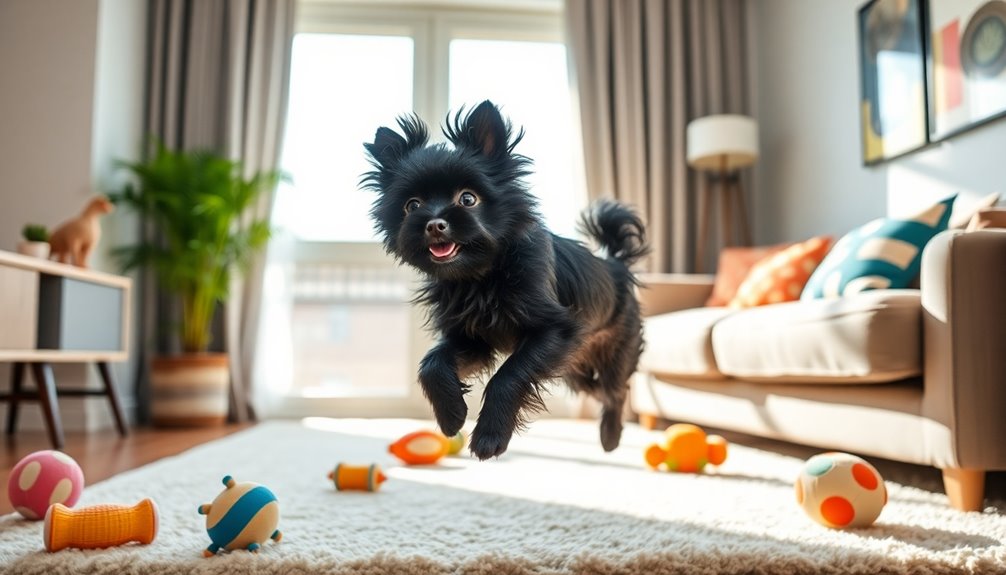
If you're an active and playful owner, an Affenpinscher could be the perfect companion for your apartment lifestyle.
Their small size and adaptable nature make them ideal for cozy living spaces, while their grooming needs are manageable with regular care. Additionally, their high energy levels mean they will require engaging activities to keep them entertained and happy.
Plus, they thrive on daily activities, so you'll enjoy plenty of fun together without needing a large yard.
Ideal for Active, Playful Owners
The Affenpinscher makes an ideal companion for active, playful owners living in apartments. Their compact size—standing just 9 to 11 inches tall and weighing between 6 to 13 pounds—means they adapt well to smaller spaces.
However, don't let their size fool you; they still need regular exercise and mental stimulation. Aim for about 20 minutes of physical activity daily, which can include brisk walks or engaging indoor play with toys.
To keep your Affenpinscher happy and healthy, incorporate activities that challenge their intelligence, like agility courses or obedience training. They thrive on interaction, so early socialization is vital to prevent any territorial behaviors. Additionally, their entertaining and loyal nature makes them a joy to have around, enhancing your apartment experience.
Remember, positive reinforcement works wonders with these spirited pups, so use treats and praise to motivate them during training sessions.
While they love to play, Affenpinschers are also alert, making them excellent watchdogs. Their loyal nature means they'll form strong bonds with you, adding joy to your apartment life.
Grooming Needs and Maintenance
Keeping your Affenpinscher looking its best is just as important as providing exercise and engagement. Their dense, wiry coat needs weekly brushing to prevent matting and remove loose hair. A slicker brush or metal comb designed for small breeds works wonders. Additionally, using a HEPA filter in your home can help reduce allergens that may affect your dog's skin and coat health.
Twice a year, you'll want to hand-strip the coat, which you can leave to a professional groomer to maintain its texture and remove dead hair. Bathing should be done as needed—typically every few months—with a gentle dog shampoo to preserve those natural oils. Regular brushing is essential since their wiry coat can trap dirt and debris. You'll also need to clean around their eyes with a vet-recommended cleaner to minimize tear stains.
Regular grooming includes trimming hair around the eyes to prevent irritation, as well as nail trimming and scissoring the feet to maintain their round shape. Professional grooming every four to six weeks is recommended to address stubborn mats and keep their coat in shape. Consistent grooming also promotes healthy skin and coat appearance, ensuring your Affenpinscher remains vibrant and comfortable.
Starting grooming from a young age helps establish a routine, making maintenance easier as they grow.
Frequently Asked Questions
How Do Affenpinschers Get Along With Other Pets?
Affenpinschers generally get along well with other dogs, especially if you introduce them properly and supervise the interactions.
However, they may show aggression towards rough or aggressive dogs.
When it comes to small pets, like rodents, they're not compatible due to their instincts.
If you have cats, gradual and respectful introductions can help.
Socialization is key, so ensure your Affenpinscher feels comfortable and secure around other pets to foster harmony.
What Are Common Behavioral Issues in Affenpinschers?
Affenpinschers can exhibit several common behavioral issues, like stubbornness and independence, stemming from their hunting background.
You might find them selective in listening, requiring consistent, short training sessions. Socialization is crucial to prevent anxiety and territorial behavior.
Additionally, they can be vocal, barking frequently to alert you of changes. Managing their barking and ensuring they get enough exercise and mental stimulation will help curb these challenges and promote a well-adjusted companion.
Are Affenpinschers Hypoallergenic?
Affenpinschers aren't 100% hypoallergenic, but they do shed less dander compared to some breeds.
While their wiry coat may seem ideal for allergy sufferers, they still produce proteins in saliva, skin, and urine that can trigger reactions.
To minimize allergens, you can groom them regularly, use HEPA filters, and maintain a clean home.
What Is the Average Cost of an Affenpinscher?
The average cost of an Affenpinscher typically ranges from $1,000 to $2,000, though prices can vary based on your location and the breeder's reputation.
In metropolitan areas, you might find higher prices due to increased demand.
If you're considering adoption, fees generally range from $50 to $600, which often includes vaccinations and initial vet check-ups.
Make sure to factor in monthly costs for food, grooming, and veterinary care for a complete financial picture.
How Often Should I Groom My Affenpinscher?
You should groom your Affenpinscher every 4-6 weeks to keep their coat in shape and prevent mats.
Brushing at least twice a week is essential to remove dead hair and maintain a healthy coat. If you choose to hand strip, be prepared for more frequent grooming.
Regularly check their ears and eyes, and trim their nails as needed.
Bathing every few months will help keep them clean and fresh.
Conclusion
In conclusion, the affenpinscher is a delightful blend of playfulness and courage, making them a unique addition to any home. Their charming personality and compact size make them ideal companions, especially in apartments. With proper training and socialization, you'll find that this uncommon toy breed brings endless joy and laughter to your life. So, if you're looking for a spirited friend who's always up for fun, the affenpinscher might just be the perfect match for you!

